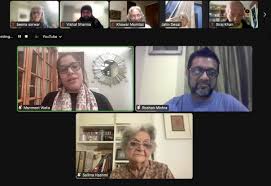“If France and Germany can be part of the European Union, why can’t Pakistan and India be part of a South Asian Union?” asked Dr Mubashir Hasan, former finance minister of Pakistan and a founder of the Pakistan-India People’s Forum for Peace and Democracy.
The former hawk-turned-dove was talking to journalist Beena Sarwar in Lahore, and when she said it sounded impossible, he replied, “Par hum baat toh kar sakte hai” (But we can at least talk about it).
Years later, in 2021, during a time of renewed tensions between Pakistan and India, she remembered the words of her late mentor who had passed away in January 2020. This idea is what lies behind the foundation of the Southasia Peace Action Network. Writing the abbreviation like a word, Sapan, rather than in all caps, conveys the meaning of a dream.
This is a dream that connects millions, giving hope for solidarity, peace, and friendship in the region. The network, which encourages dialogue and connections amongst South Asians and across various issues, has managed to virtually overcome borders and build bridges between those who have historically been divided.
Commitment to dialogue
The idea of meeting each other without the hassle of obtaining visas was a resilient attempt at peace and friendship. At the third anniversary of Sapan last weekend, commemorated at a virtual event live over Zoom and YouTube, organisers reviewed Sapan’s achievements in the past three years, presented by youth activist Sarita Bartaula from Nepal. Well known feminist activist Khawar Mumtaz in Lahore who hosted the milestone event, highlighted the organisation’s ongoing commitment to fostering dialogue and understanding.

Participants looked back and looked forward. The brief ‘In Memoriam’ paid tribute to giants in the peacebuilding sphere, like Dr Mubashir Hasan, Nirmala ‘Didi’ Deshpande, journalists Kuldip Nayar and I.A. Rehman, human rights lawyer Asma Jahangir and many others. There was a special tribute to members of the ‘peacemongers’ tribe who have recently passed on, like journalist Babar Ayaz in Karachi, senior activist Radhakant Saxena of the People’s Union for Civil Liberties, Jaipur, and not least, former Indian Navy chief L. ‘Ramu’ Ramdas, a founder member of Sapan and a longtime peace and anti-nuclear activist.
The ‘peacemongers’ vowed to not only continue talking to each other, but to continue talking until they achieve their dream, their Sapan, of a South Asia with soft borders, or at least, ease of visas.
The past three years of Sapan activities and connection-building are a testament to the unwavering support and faith for the ideals enshrined in the three-point Founding Charter. Nearly 80 organisations and hundreds of individuals in the region and beyond have endorsed this call for soft borders, healthy cooperation, and dignity for all in the South Asian region.
As the saying goes, “The heart wants what it wants”. This is reflected in Sapan’s concentrated, consistent efforts with a Whatsapp channel, dedicated ‘Peacemongers’ groups, regular monthly webinars, campaigns, and consistent check-ins, campaigning for peace and harmony in South Asia.
Art beyond borders
The second part of the meeting featured a thought-provoking discussion on art and artists beyond borders. The panelists included acclaimed artists Salima Hashmi, Manmeet Walia, and Roshan Mishra, joining from Pakistan, India, and Nepal respectively. They recognized how art is a thread that connects artists across the South Asian region because it is expressed in the language, known to all.
“Through Art, we reflect each other,” said Roshan Mishra, emphasising our ‘sameness’ in the ‘other’.
The event concluded with a ‘solidarity song’ written by the iconic Southasian feminist Kamla Bhasin, “Tumhara sath milne se” (With your support), sung by three generations of Bangladeshi feminists led by the feminist activist Khushi Kabir, together with Sohanna Ahmed and Bipasha Saed. With this song, there was a mutual recognition that we may have a million miles to go, but at least we have started, and we are in it together.
The virtual anniversary event brought together a diverse range of intergenerational peacemongers, including supporters, experts, members, volunteers, and friends. After the recording stopped, many lingered on to catch up with each other, meet new friends, and express their support.
Seniormost was probably Vasanth Pai, 92, in Bangalore. He has been part of the peace movement since 2010 when he was involved as a volunteer with Aman Ki Asha (Hope for Peace). From Islamabad, human rights activist and former Pakistani senator Farhatullah Babar also stayed on to express his solidarity and support. And that’s why “Hum Baat Karte Rahenge: We will continue to talk” is so powerful.
(The author is an Indian-origin peace activist from Jaipur, with a masters in Peace and Conflict Studies from the University of Manchester, UK. She is currently based in Manchester and is a volunteer with Sapan. Views are personal. By special arrangement with Sapan News)
